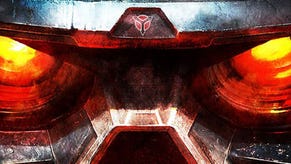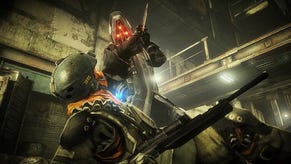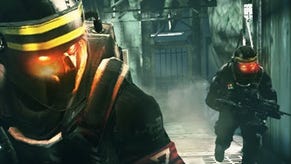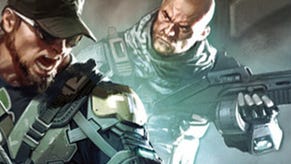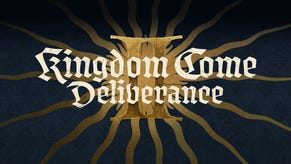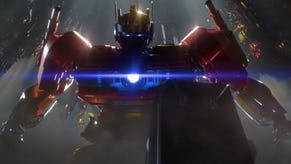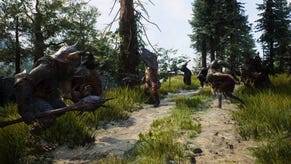Killzone: Mercenary - the "definitive FPS" control freak
Guerrilla is attempting to make the "definitive FPS" for Vita in Killzone: Mercenary, studio boss Herman Hulst tells Patrick Garratt in Amsterdam. It has every chance of succeeding.
"Call us control freaks, maybe, but when you've been working on something for ten years, you're not going to let it be anything less than what you want it to be. I'm happy with the progress."
Calling Killzone "Sony's Halo" isn't fair. Yes, it's a first-party sci-fi FPS, but it's so distinct from Microsoft's flagship shooter that it's competing only on marketeering spreadsheets and fanboy keyboards. It's different. It's grimy, savage, and has a reputation for pushing Sony platforms to their limits. Killzone: Mercenary, the first in the series on Vita, will be in keeping with earlier efforts.
"The goal for this project was to make the definitive FPS for the platform," says Guerrilla Games MD Herman Hulst, speaking to VG247 in his office overlooking the Herengracht canal in Amsterdam. "That's the primary goal for me. It's in line with our typical goals for projects. We like to take a piece of hardware and see how much juice we can squeeze out of it, and with this platform it's no different."
Mercenary will release in September, and, from what we saw of both the single-player and multiplayer last week, achieving the project's primary aim is a given. The shooter looks superb, for a start, being based on the Killzone 3 engine and running on a piece of kit that can provide comparable (ish) performance to PS3, and its 6-8-hour campaign and full multiplayer mode means it'll represent good value, even for a full price handheld game.
But as good as Mercenary seems, it's true that Black Ops Declassified - the game Vita apologists hoped would buoy the machine late last year - sucked hard enough to barely scrape 30% on Metacritic. While Guerrilla's latest will almost certainly be fantastic, Hulst is shooting at something of an open goal. He doesn't pore over negatives, though.
"I tend to think in possibilities: what could we do on this platform? If you create something that's innately good on a particular platform, only then does it have a chance of being picked up by the masses. That's what I can do as a game-maker; I can make something that belongs on that platform, that uses it, that's intuitively married with its capabilities and specs. That's the starting point."
Putting "mass" and "Vita" in the same room is something of a sore point for Sony. It's no secret the console's struggling, while the performance of iOS and Android continues to be detonative. Regardless, Guerrilla hasn't been drawn by phone and tablet games in working on Mercenary.
"Most people are pretty platform agnostic when it comes to their own consumption," says Hulst. "I think the starting point for this project was a Killzone game on a handheld, to capture the essence of Killzone, to take the visceral combat, the graphical prowess, and bring it home, rather than looking for external motivation. It came from within."
He shrugs off competitive mobile OS as it relates to Sony's handheld business in general.
"I have an iPhone and an iPad like many other people," he says. "There are many more people now that use them for games, typically for pretty light usage. I would like to think that there are a lot of people that sample content, and it's our challenge, our job, to see people liking that handheld game experience and offer them something a lot more immersive."
Mastery
Mercenary is the first Killzone game to be made outside the Amsterdam office. Sony's Cambridge Studio, now Guerrilla Cambridge, is creating the title in collaboration with key members of Hulst's team. Cambridge worked on both Killzone 2 and Killzone 3, partnerships which gained the Dutchman's trust.
"I believe we've found a team who clearly really wanted to be part of this project, and they have a lot of experience with Killzone," he says. "Just grabbing a team and saying, 'Go make that Killzone game'; I don't think I would have done that. With these guys, half the team has gone through learning the art style, and I knew through their work on LittleBigPlanet PSP that they had a real passion. That wasn't a porting job; it was a real game."
The Guerrilla Amsterdam execs are "very involved in making sure the game is everything we want the franchise to stand for. Call us control freaks, maybe, but when you've been working on something for ten years, you're not going to let it be anything less than what you want it to be. I'm happy with the progress. I'm really happy that the team in Cambridge is so excited about having this opportunity. So far, I'm very pleased with the collaboration."
There's an easy answer to the obvious question: why did Mercenary go to Cambridge at all? Hulst announced in 2010 that Guerrilla is working on a new IP, its first fresh property since Killzone and Shellshock. It sounds as though the new game is a major one. Hulst tells me there are 175 people on Guerrilla's pay-roll (I didn't clarify if this included the Cambridge team) and an extra 20 contractors in the Dutch building. The studio has grown by around 20 people in the last calendar year, and is now at the most populous in its history. While it's "too early" to talk about what's next for the Sony-owned company, whatever it is will be large. And obviously next-gen. Hulst doesn't do things by halves.
Actually, he does.
"I want to do both," he says when I ask him about the continuation of Killzone and the creation of the new game.
"Clearly, new stuff is very exciting, particularly for people that work on a franchise for a long time. A lot of technical staff don't care so much about the project, unlike the artists and the designers, who care a lot. Of those people, there's a big chunk that love working on the Killzone franchise, and there are also some people that are happy to experiment with new stuff.
"But don't forget that we were a very small company when we started, so a lot of the people that work here now have joined us over the years. Many of these guys specifically came here to work on Killzone. Doing Killzone: Mercenary is really great. It's also enabling us to make better games, because you're working on the shoulders of what you've done previously, so in that sense proving yourself is also nice.
"There's the appeal of the newness, and the appeal of the mastery of things. They're both exciting."
Killzone: Mercenary releases for Vita in September. Check out new footage, multiplayer impressions and single-player impressions from our visit to Guerrilla in Holland last week.



